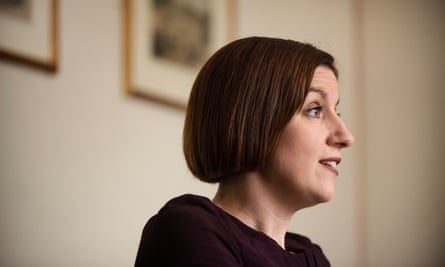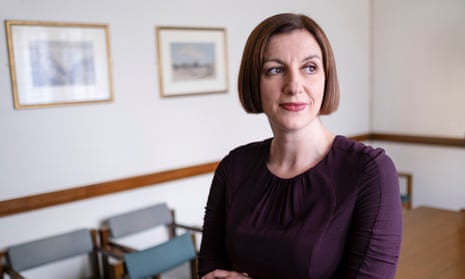More graduate teachers would be parachuted into nurseries under plans being considered by Labour to improve education for under-fours, the Guardian has learned.
There could also be more nursery places in primary school settings as the opposition works up proposals to drive up standards and formally integrate early years into the English education system.
Experts have long argued that nurseries should employ degree-level early years teachers, alongside other staff, to help toddlers develop skills including speech and language before they start primary school.
Currently, however, nurseries are struggling to recruit and retain staff, who can receive higher wages in retail jobs, forcing some childcare settings to close.
The shadow education secretary, Bridget Phillipson, said she wanted to put early years on an equal footing with schools to give children the best start in life in a way that could not be reversed by future Conservative governments, which had “chipped away” at Sure Start.
In an interview with the Guardian, she said: “We know that so much is determined for children early on and that you can make the biggest impact in the early years, yet the system we’ve got right now deprioritises so much of what goes on in our early years settings.
“We need to raise the standing of the sector, make it part of the education system so that it is regarded with the same parity as our schools. What you achieve in the early years makes such a big difference.”
Phillipson, who will introduce Keir Starmer as he launches the last of Labour’s five policy missions on Thursday, said she was “determined to deliver graduate-led nurseries” and more training for childminders with a workforce plan to get more highly trained staff teaching the youngest children.
With falling school rolls across many parts of England, including London, and childcare “deserts” in areas such as Cumbria and the south-west, Labour officials are also understood to be looking closely at how they integrate early years education into existing primaries.
“In so many communities there just aren’t the places for children, and that’s why we’re setting out plans for how we will allow councils to deliver more childcare places,” she said.
There are about 400 state-maintained nurseries in England, all with degree-level leadership and attached to primary schools, and another 1,300 primaries without early years settings on site. There are thousands more private nurseries.
Labour has been reluctant to commit to extra spending for education as it attempts to convince voters that it can be fiscally responsible ahead of the next election. However, Phillipson hinted that a Labour government would focus on early years as the economy recovers.
“When I visit secondary schools, headteachers tell me: if you have any more money to spend, please go and spend it on the early years, because by the time children arrive at my door, so much has already been determined and we do our best but it’s really hard,” she said.
“We need to start earlier and have a focus on early years because by the time children arrive at school that gap has already started to widen.”
Phillipson denied that the chancellor had stolen a march on childcare in the budget when he announced a £4bn expansion of free childcare for all preschool children from 2025. “Jeremy Hunt didn’t shoot our fox at all. In fact, he’s given us a better baseline from which to build a better system,” she said.
Education faced “enormous pressures” that would take time – and money that Labour was unable to commit – to address, she said. But she would have a “clear plan” coming into office.
after newsletter promotion
“I’ve got to be upfront about the fact that as education secretary I won’t be able to fix that overnight – it will take time. But if we win the election, we can hit the ground running and make changes straight away. Teachers and parents will see a difference.”

With two days of school strikes planned for this week, Phillipson said she would “rather they didn’t go ahead” as children would miss out on more time at school, but said the responsibility lay with the government rather than teachers.
She refused to commit Labour to pay rises for teachers, saying only that in the government’s position she would sit down and negotiate. However, she said the real-terms pay cuts of the last decade were “not the situation” under Labour and that she would love to commit to more support for teachers as she “knows how hard they work”.
Phillipson said she wanted to reset the relationship between teachers and the government, with too many feeling underpaid and undervalued. Labour has already offered a retention payment for those new to the profession worth about £2,400 each.
With almost 600 schools in England identified as being at possible risk of structural collapse, she revealed her own children were among those who had time out of school because of the “terrible nature of the school’s estate”.
She added: “If we’re just patching up buildings when bigger changes are required, that’s poor value for money for the taxpayer. It costs more money in the long run.”
The Labour politician defended the party’s plan to end tax breaks for private schools, which would help raise £1.6bn to allow state school children to have the opportunity to take part in activities such as sports, debating and music.
After the body representing independent schools in the UK described her as “very chippy” in private messages as a result of the policy, she said she was “proud to be chippy”, adding: “It’s chippy people who get things done and make a difference”.
